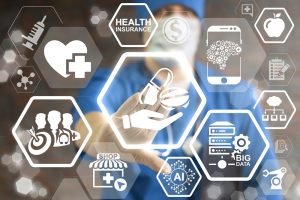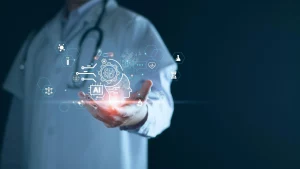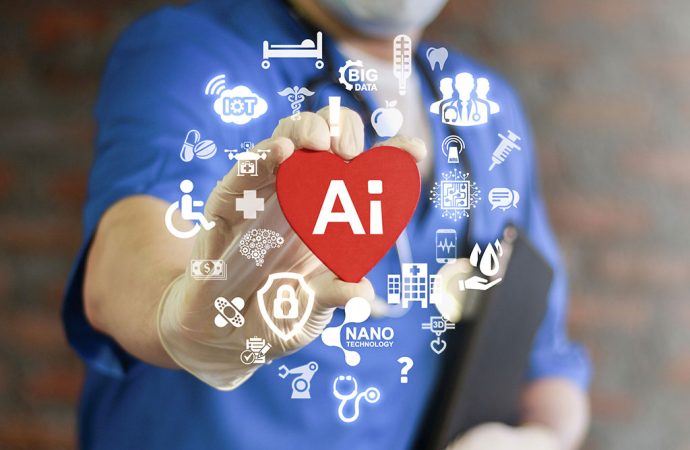Revolutionizing Healthcare with AI-Powered Diagnostics The healthcare industry is undergoing a monumental transformation, largely driven by the rise of artificial intelligence (AI). From medical imaging to personalized treatments, AI-powered diagnostics are fundamentally reshaping how healthcare providers deliver care. This cutting-edge technology leverages machine learning and deep learning algorithms to analyze vast amounts of medical data,
Revolutionizing Healthcare with AI-Powered Diagnostics
The healthcare industry is undergoing a monumental transformation, largely driven by the rise of artificial intelligence (AI). From medical imaging to personalized treatments, AI-powered diagnostics are fundamentally reshaping how healthcare providers deliver care. This cutting-edge technology leverages machine learning and deep learning algorithms to analyze vast amounts of medical data, offering faster, more accurate, and cost-effective diagnoses. In this article, we will explore the role of AI in healthcare diagnostics, its benefits, and real-world case studies illustrating how AI is revolutionizing patient care.
The Role of AI in Healthcare Diagnostics

Image by Yandex.com
AI in healthcare refers to the use of sophisticated algorithms and machine learning techniques to process and analyze medical data. These AI tools are designed to replicate human decision-making, but with enhanced speed, precision, and the ability to process large volumes of data. The impact of AI in diagnostics is particularly profound as it assists healthcare professionals in detecting diseases, making predictions, and delivering personalized care.
AI-powered diagnostics focus on analyzing a range of data, such as medical images, genetic information, electronic health records (EHRs), and even lifestyle factors, to uncover patterns that may not be immediately apparent to human clinicians. By doing so, AI systems help improve the accuracy of diagnoses, reduce human error, and expedite treatment decisions.
AI in Medical Imaging: Revolutionizing Radiology
One of the most significant areas where AI is making a transformative impact is medical imaging. In radiology, AI tools are already assisting doctors in interpreting X-rays, MRIs, CT scans, and other imaging modalities. These AI systems are designed to detect subtle abnormalities or patterns that may go unnoticed by the human eye, which is particularly valuable for diagnosing conditions like cancer, cardiovascular diseases, and neurological disorders.
Example: Google’s DeepMind and Eye Disease Diagnosis
One of the most impressive case studies in medical imaging comes from Google’s DeepMind. DeepMind developed an AI system that can analyze retinal scans to diagnose eye diseases like diabetic retinopathy and age-related macular degeneration. In clinical trials, the system outperformed human experts in diagnosing these conditions, offering a glimpse into AI’s potential to augment medical expertise. By detecting these diseases early, the system could significantly reduce the risk of vision loss in millions of patients worldwide.
AI for Predicting Disease Outcomes
Predicting the progression of diseases is another area where AI is proving invaluable. Traditional healthcare models often rely on subjective assessments and past experiences to predict outcomes, but AI can analyze vast amounts of patient data to make predictions with a much higher degree of accuracy. This predictive power is particularly useful in conditions such as cancer, heart disease, and chronic illnesses.
Case Study: Predicting Heart Disease Risk
A study published by the American Heart Association demonstrated the potential of AI in predicting heart disease. Researchers used machine learning models to analyze patient data, including demographic factors, medical history, and lifestyle choices, to predict a patient’s risk of a heart attack or stroke. The results were highly accurate, enabling doctors to provide earlier interventions for high-risk patients. By identifying individuals at risk before symptoms manifest, AI has the potential to reduce the incidence of heart disease and improve patient outcomes.
AI in Genetic and Molecular Diagnostics
AI’s ability to analyze genetic and molecular data is revolutionizing the field of precision medicine. With the advent of genomic sequencing, doctors now have access to an unprecedented amount of genetic data, which can help identify genetic predispositions to diseases and personalize treatment plans accordingly. AI plays a critical role in interpreting this complex data and making sense of genetic mutations.
Example: AI and Cancer Detection
One of the most powerful examples of AI in genetic diagnostics is its use in cancer detection. AI tools are being used to analyze genomic data to identify genetic mutations associated with specific types of cancer. For example, IBM Watson for Oncology is an AI-powered system that analyzes patient data, including medical records, genetic information, and clinical trial results, to recommend personalized cancer treatment plans. This allows for more targeted therapies, increasing the likelihood of successful outcomes.
AI in Pathology: Enhancing Accuracy and Speed
Pathology is the cornerstone of disease diagnosis, as it involves examining tissue samples to identify abnormalities such as tumors, infections, or autoimmune diseases. Traditionally, pathologists examine slides under microscopes to make diagnoses, a process that is both time-consuming and subject to human error. AI-driven pathology tools are changing this by automating the analysis of tissue samples, allowing for faster, more accurate diagnoses.
Case Study: PathAI’s Contribution to Cancer Diagnosis
PathAI, a company that develops AI-powered tools for pathology, has created an algorithm capable of analyzing pathology slides to detect various cancers, including breast and prostate cancer. In clinical trials, PathAI’s system was shown to match or exceed the performance of experienced pathologists. By providing faster and more accurate results, PathAI’s technology is improving patient outcomes and reducing the burden on pathologists.
Wearable Devices and AI: Continuous Health Monitoring

Image by Yandex.com
Wearable devices are becoming an integral part of modern healthcare, with products like smartwatches, fitness trackers, and medical-grade sensors providing valuable insights into an individual’s health. When combined with AI, these devices have the potential to revolutionize continuous health monitoring and early disease detection.
AI algorithms can process real-time data collected by wearables to detect abnormal patterns or potential health issues, such as irregular heartbeats, abnormal blood pressure, or even early signs of respiratory distress. This constant monitoring allows for early interventions and a more proactive approach to healthcare.
Example: Apple’s ECG Feature and AI
A standout example is Apple’s ECG (electrocardiogram) feature, which is available on the Apple Watch. This feature uses AI to analyze electrical signals from the heart, detecting irregularities like atrial fibrillation (AFib). By alerting users to potential issues, the Apple Watch empowers individuals to seek medical attention before their condition worsens, demonstrating how AI-driven wearables are improving healthcare outcomes.
Key Benefits of AI-Powered Diagnostics
The integration of AI into healthcare diagnostics offers numerous benefits, transforming patient care and clinical workflows.
Improved Diagnostic Accuracy
AI has been shown to enhance diagnostic accuracy by identifying subtle patterns that may be missed by human clinicians. For instance, AI algorithms can detect early-stage cancers or rare diseases that are often challenging to identify through traditional diagnostic methods.
Faster Diagnosis and Treatment
AI’s ability to process large volumes of data in seconds enables faster diagnosis, which is particularly important in emergencies. Faster diagnoses translate into quicker treatment, which is often crucial for saving lives and preventing complications.
Cost-Effective Healthcare
By streamlining diagnostic processes, AI helps reduce the need for expensive follow-up tests and repeated procedures. It also minimizes the likelihood of misdiagnoses, which can lead to costly treatment delays.
Personalized Medicine
AI’s ability to analyze genetic and clinical data allows for personalized treatment plans. This tailored approach maximizes the chances of successful outcomes by matching patients with the most effective therapies for their unique conditions.
Improved Access to Healthcare
AI-powered diagnostics can improve access to healthcare in remote or underserved areas. AI systems can be deployed through telemedicine platforms, enabling healthcare professionals to remotely analyze patient data and offer diagnostic insights.
Challenges and Concerns in AI-Powered Diagnostics
While the benefits of AI-powered diagnostics are clear, several challenges remain:
Data Privacy and Security
The use of AI in healthcare requires access to sensitive patient data, raising concerns about privacy and security. Ensuring that AI systems comply with data protection regulations (such as HIPAA in the U.S.) is crucial to safeguarding patient trust.
Bias in AI Models
AI systems are only as good as the data they are trained on. If the training data is biased or unrepresentative, AI models can perpetuate healthcare disparities, particularly for underrepresented groups. Ensuring diverse and inclusive datasets is essential to mitigate this risk.
Regulation and Oversight
AI in healthcare is still in its early stages, and regulatory bodies are working to establish frameworks for approving and overseeing AI-driven diagnostic tools. Clear guidelines are necessary to ensure the safety and efficacy of these technologies.
Human-AI Collaboration
While AI can assist in diagnosis, it is not a replacement for human expertise. The best outcomes occur when AI and healthcare professionals work together, combining the strengths of both to deliver optimal patient care.
The Future of AI in Healthcare Diagnostics

Image by Yandex.com
The future of AI-powered diagnostics holds great promise. As machine learning algorithms become more advanced and datasets continue to grow, AI will be able to provide even more precise and personalized insights. We can expect to see AI tools integrated into nearly every aspect of healthcare, from predictive analytics to real-time monitoring and beyond.
In the coming years, AI’s ability to predict disease outbreaks, analyze large-scale genomic data, and develop new treatments could transform the entire landscape of healthcare. Combining AI with other emerging technologies, such as robotics and 5G connectivity, will further enhance the accessibility and effectiveness of healthcare services.
FAQs
1. What is AI in healthcare diagnostics?
AI in healthcare diagnostics refers to the use of algorithms and machine learning to analyze medical data and assist healthcare providers in diagnosing diseases.
2. How accurate are AI-powered diagnostic tools?
AI-powered diagnostic tools can be highly accurate, often matching or exceeding the performance of human doctors in certain areas, like medical imaging and pathology.
3. Can AI replace doctors in diagnostics?
AI is designed to assist doctors, not replace them. The best outcomes are achieved
















